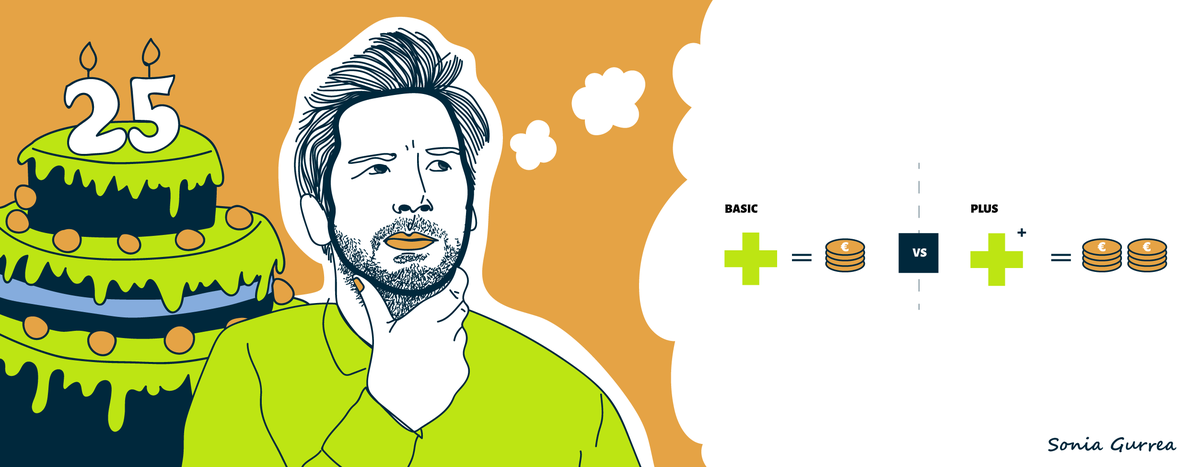
The gap between young people and private health insurance
Published on
Translation by:
I've just turned 25 and I can already hear the emergency bells ringing. The time has come to sort out my private health insurance. A difficult but symbolic part of becoming an adult, choosing private healthcare insurance is quite scary for many young people in France. And I'm no different. Welcome to the meanderings of a life full of procrastination, calculating and maternal pressure.
"What, you haven't got one yet? You can't carry on like this, you must find one." Another Sunday goes by, I've graduated, moved out and jumped into working life. And for my mum, getting private medical insurance (PMI) is more urgent than finding a permanent work contract or finding a husband. Because you see if you have an accident, we could end up paying for it our entire lives. I am young and want many things. And spending my money on private healthcare is not really one of them. But I am young and full of uncertainties. So to please my mum, I went to see my previous health insurer, the one that used to cover me with my dad's insurance policy. Here are our different insurance plans, for basic cover starting at 27€ a month. I'm not ready for this. The feeling of having to fit into to some sort of standard made me want to escape. So I threw the leaflet on the table between the orchid and the advent calendar and hanging on to my passion for life, I left without looking back.
Ouch mum
Apparently I'm not the only one. In France, young people between 20 and 29 represent the category of people with the most basic coverage regarding private health insurance due to precarious conditions, non-urgent healthcare needs and a lack of knowledge of the system. In 2018 in France, all students were put on state healthcare insurance, allowing them to have free social security, where they had to pay 200 euros at the beginning of each year, beforehand. Although students no longer need to subscribe, or choose between different providers, they now seem to show less interest in their healthcare coverage. De facto, many still can't tell the difference between state and private health insurance. But this is not the only reason. After graduating, many young workers do look into the matter, out of choice, or necessity. Yet still, like me, take the pamphlet, smile, and walk out.
Paying out monthly premiums for "hypothetical" needs isn't very tempting, especially when money is short. All the more, rates continue to increase over the years. And for good reason, between 2006 and 2017, healthcare expenses increased by 30%. 10 years ago, it used to cost me 20 euros to see my GP, now it costs me 25. Daily hospital fees have also gone up by 2 euros. In 2017, Thierry Beaudet, President of the French mutual societies sector told us in an interview given to the Echos magazine, "Over a long period of time, premiums will rise due to the increase in healthcare expenditures. Over the last few years, this increase means private medical insurers have 400 million euros of extra reimbursements per year”. Furthermore, during his campaign promises, Emmanuel Macron emphasised his intentions to reimburse in full, glasses, dentures and hearing aids for all by 2022. And even if this is not what the government wanted, premiums are rising fast and have been doing so over the last few years.
With all this going on, it's quite hard to get the gist of what the spirit of mutuality is. Because unlike conventional companies, "mutuelles" or Private Health Insurers have neither capital nor shares. They are run by policy holders, who are represented by elected volunteer members. In other words, they weren't created to generate profit, but to “undertake action plans in terms of preventative healthcare, solidarity and mutual aid”, according to the mutual insurance code. That is if you are sure your private healthcare insurer really is one and not just any insurer misusing the designation of "mutuelle".
Minimal coverage
At university, there are other concerns. With rates going up, students who aren't already covered under their parent’s policy don't necessarily want to sacrifice part of their tight budget on private insurance. But for those who regularly need to see a physician, they can't really go without one. So generally, they go for the cheapest cover. “I decided to take out my own private medical insurance, I was paying 25 euros a month. But when my eyesight got worse, I had to pay 150 euros out of my own pocket for glasses that were worth 250 euros”. Audrey, a former radiology student tells us. Basic coverage does not give full reimbursement for healthcare costs and medical equipment. This is why providers often suggest insurance plans with better cover, but premiums are of course higher. In the long run, this solution is more sensible and is what most families and elderly people go for. But this is not the case for those with a tight budget.
The outcome being that many students neglect their health, and amongst those who have already put healthcare aside, 49% of them did so for financial reasons, according to a study conducted by the Observatory on Student Life in 2013. And as for reimbursements, you could be in for a shock if you decide to go to a physician other than your referring one. “I hardly ever went to see the doctor, I used to get over-the-counter products, it was quicker and often cheaper", Audrey tells us. Furthermore, we found out in the survey mentioned above that students who undertake higher education are those who suffer the most from stress and other health problems. Yet, they belong to the category of students that give up on healthcare the most (23-25 years).
Private health insurance is one of those things you leave in the back of your head. Until you really need it. “After university, I went without private health insurance for about 6 months. I didn't really know what I was looking for, and I didn't really have much time to look for one either. And I definitely didn't want to end up spending a fortune every month, since I never go to the doctor's anyway”. Mylène, who finished law school in 2016 says “My mum would question what would happen if I needed to be admitted to the hospital? « I'm careful ». It has to be done sometime, so you get it over and done with. So, I've taken out private medical insurance with basic coverage. But when I have a job with a company, the health insurance scheme has better options. I'll be able to see an ophthalmologist and change my glasses”. Mylène is currently unemployed, and her eyesight is getting worse, but she'll have to wait a bit. Aurore is in the same situation, squinting her eyes so she can read the subtitles on T.V.“I'm going to wait a bit before buying glasses, otherwise I'll end up paying half".
Young workers who postpone health expenses don't necessarily come from a precarious environment. Middle class and upper-middle class graduates also reflect on the need to save money. Travelling, going out, and especially investing in the future are more important than dentists and contact lenses. What's ironic about it is that should a serious accident occur, young people may not have sufficient health coverage for hospital fees. Nor enough savings to pay the bill. In the event of a hospital stay, social security will only cover part of inpatient hospital fees. Medical bills gradually mount up and can soon exceed your means. Even a small health problem could lead us to consult a specialist, probably needing several sessions. Leaving us with expenditures exceeding social security reimbursements. Private health insurers therefore cover the expenses and pay what's left over.
Despite the risks involved, us young people tend to put paperwork aside. Like my future PMI, who's endlessly waiting for me to make a decision. But we are more concerned about professional future related issues such as looking for an internship, revising for exams, being nervous about a first job, than anything else. But since we're full of energy and good intentions, we'll take a look. Who knows, we might even take a leaflet.
Illustration : © Sonia Gurrea

This article is part of a partnership with Mutualité Française about healthcare issues in Europe. The series is called Cheers. The idea? To discuss social healthcare in an engaging and interesting manner with young people in Europe.
Translated from Jeunes et mutuelles : ce qui nous sépare



